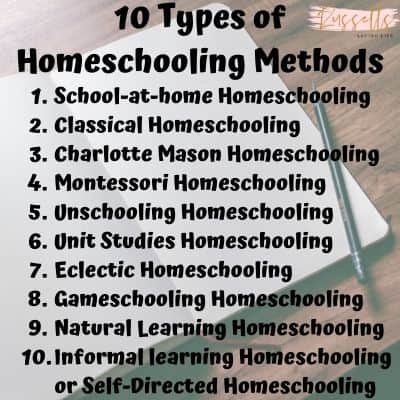When I first started homeschooling I did not know there were so many types of homeschooling until I stared researching.
10 Types of Homeschool Styles
- School-at-Home Homeschooling
- Classical Homeschooling
- Charlotte Mason Homeschooling
- Montessori Homeschooling
- Unschooling Homeschooling
- Unit Studies Homeschooling
- Eclectic Homeschooling
- Gameschooling Homeschooling
- Natural Learning Homeschooling
- Informal learning Homeschooling or Self-Directed Homeschooling

When homeschooling you do not have to fit into one of the style. Our homeschool usually falls under a mixture of homeschool styles. I hope this helps you find what works best for your family.
I had a little help from some awesome homeschool mom to help explain these homeschool styles in their own videos.
What is School-at-home Homeschooling?
School-at-home is when you mimic public or private schools in your home. Most new homeschooling families start with this method until they figure out what works best for them. Most of the time, when you buy an All-In-One curriculum or School in a box this is the type of method you are doing. We have used this method since we stared homeschooling and it is what works best for us, but it may not work well for everyone. We use My Father’s World curriculum and we love it!
What is Classical Homeschooling?
Classical homeschooling focuses on a three part process. The first part is the Grammar Stage. The Grammar Stage is when you build a basic knowledge of the core subjects like math, language arts, science and history. The second part is the Logic Stage. The Logic State is when children want to know more about a topic or subject. Children typically state asking “why”. These questions help them to reach a conclusion on their own. The Third and final part is the Abstract Stage. The Abstract or Rhetoric Stage combines their knowledge of core subjects and their ability to reach a conclusion together.
What is Charlotte Mason Homeschooling?
Charlotte Mason Homeschooling was developed by Charlotte Mason. She thought children should learn through literature and she even coined the phrase “Living books”. She wanted to spark the imagination of a child through subject matter. Charlotte Mason’s motto was “Education is an atmosphere, a discipline, a life.” She wanted wanted children to learn self-discipline as well as their academics. When using this method to homeschool, you will read lots of literature, explore nature outside, art, music, journalling, dictation and copy work.
What is Montessori Homeschooling?
Montessori is also known as Montessori Method of Education. It was developed by Maria Montessori and her method focuses on the development of children, physically, socially, emotionally, and cognitively. Parents coordinate and the child directs the learning. What I mean by this is that the parents find curriculums or material that fit their child’s interest. This encourages students to learn more about their interests. The Montessori method encourage children to pick what learning activities they want to use, have hands on activities, work at their own pace, and learning methods.
What is Unschooling Homeschooling?
Unschooling is informal learning where the student learns though life experiences. “The term “unschooling” was coined in the 1970s and used by educator John Holt, widely regarded as the father of Unschooling,” according to Wikipedia. Mary Griffith, author of “The Unschooling Handbook” states, “Unschooling means learning what one wants, when one wants, in the way one wants, for one’s own reasons.” Unschooling is becoming a more popular way to homeschool. Most children learn better through hands on activities and learning through fun and educational play.
What is Unit Studies Homeschooling?
Unit Studies Homeschooling is when core subjects are taught on one single topic. This method is usually used by Homeschooling families that teach different aged children at one time. Unit Studies also allow children to dive deeper into a topic. Children will usually retain more from this method.
What is Eclectic Homeschooling?
Eclectic Homeschooling is when you pick and choose from many different books, websites, curriculums, board games and so on to teach your children. Many homeschool families choose this method. Using this method allows you to pick what works best for each of your children. For example, just because one math curriculum works well for one of your children, does not mean it will work well with all of them.
What is Gameschooling Homeschooling?
Gameschooling is when a board game is used to help a child learn a particular skill or to learn more about a subject. Gameschooling is a fun way for kids to learn more about a subject and have fun at the same time. Some homeschool families decide to game school instead of using a curriculum for a given subject.
What is Natural Learning Homeschooling?
Natural Learning Homeschooling is when a child picks a topic they are interested in and learns about it through hands on activities. It is more child led and the parent coordinates activities to support and encourage learning.
What is Informal learning Homeschooling or Self-Directed Homeschooling?
Informal Learning Homeschooling or Self-Directed Homeschooling is learning through every life events. Some examples are: planting a garden, learning to back, shadowing someone at work, and even learning through a life event or experience.
If you have more homeschool questions, Click Here!

If you want to see what curriculums I used, click here.
